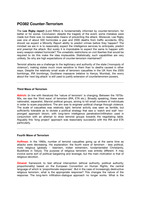Lecture notes
PO382 Revision Notes - Counter-Terrorism
- Institution
- The University Of Warwick (UoW)
Revision notes on Counter-Terrorism in Vigilant State. Topics covered: - Lee Rigby Report - Third/fourth waves of terrorism - Complex environments - UK responses - Operational problems of suppression - Operational problems of concession
[Show more]



